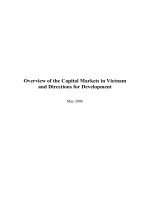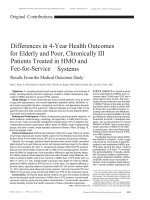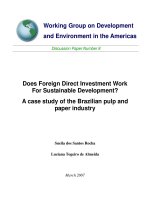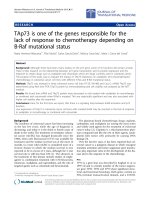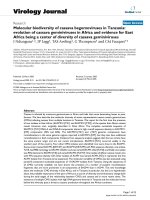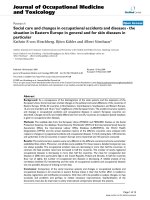Employability b2 Work, in general, and employment for students after graduation, is one of the essential human requirements that must be met to ensure everyday life and overall growth
Bạn đang xem bản rút gọn của tài liệu. Xem và tải ngay bản đầy đủ của tài liệu tại đây (56.01 KB, 7 trang )
I. Task 1: 750w
Work, in general, and employment for students after graduation, is one
of the essential human requirements that must be met to ensure everyday life
and overall growth. Students are now unable to find work after graduation, a
concerning scenario that has become a societal crisis. As a result, it is tough
to obtain work but much more challenging to find suitable employment in the
training field. Unemployment not only harms students, families, and society
economically, but it also wastes the country's intellectual resources. This
research looks at ideas connected to employability literature, outlining the
theoretical foundations and four components of higher education that
employers typically utilize as competence evaluation criteria. The research
also evaluates the graduate labour market for human resource management
and the capacity to self-assess the ability to apply for desired positions.
Graduate employability is commonly understood in current discourses
to be the same as graduates' establishment on a job market after graduation
(Nilsson,
2016).
However,
some
researchers
argue
that
graduate
employability is "clearly not the same as graduate employment rates" and
should instead be defined as "suitability for graduates' employment" (Nilsson,
2016). Employability, according to Nilsson, is a combination of four aspects
of higher education: "understanding of subject matter" (propositional
knowledge in the form of mastery of the degree's subject matter), "skilful
practices" (these can be used as procedural) knowledge), "efficacy beliefs"
(the belief that one can generally have some impact on situations and events),
and "metacognition" (awareness of what one knows and can do, and how one
learns more. Furthermore, employability skills, including problem-solving,
effective communication, critical thinking, interpersonal skills, and the ability
to work in a team, are vital for entry-level graduates to be productive and
efficient on their first job (Whitcomb & Whitcomb, 2018).
1
For many years, Vietnam has been recognized for its low labour costs
and vast labour resources (Nguyen, 2019). On the other hand, science and
technology have advanced swiftly, necessitating high-quality, professional,
certified, and specialized personnel. According to the General Statistics
Office, the national workforce has steadily expanded over the last decade,
rising from 50.4 million in 2010 to 56.2 million in 2020. However,
management, informal and unskilled employees continue to account for the
majority (Thanh, 2022). The workforce with training, certifications, and
credentials remains low, accounting for around 24.5% of the workforce in
2020. Because their workers have been trained, most firms with foreign
charter capital choose to recruit management from other countries. Many
students choose temporary jobs after graduating from cultural schools in rural
regions to remain in the city and later acquire a solid career. Most of the tasks
they undertake do not need a degree, such as waiting tables in cafés and
restaurants or working as a telephone operator or part-time tutor. Simple
occupations, thus the pay is low, yet finding such a job is difficult. The
problem above happens not just with students rated as excellent or average,
but even students whom institutions highly regard struggle to get work.
Because they could not find work after graduating from college or university,
many students elected to pursue a master's degree or a second degree. Many
graduates have found work after suffering for a few months, but most cannot
find work in their study area. To acquire these additional positions,
management students must master many hard skills that are often
significantly different from their area of speciality. As a result, finding work
for students after graduation is a significant societal challenge.
Human resources are regarded as a company's most valuable asset.
Above all, human resource concerns garner significant attention in today's
highly competitive market. The human resource management sector is critical
2
in assisting organizations in running their operations successfully. As a result,
each student should analyze their capacity to satisfy the recruiting goals of
businesses.
In Vietnam, difficulties in obtaining work opportunities and satisfying
the expectations of employers for new graduates are becoming a hurdle,
resulting in a waste of human resources. With a future goal of becoming a
training specialist, I realize I have a strong comprehension of professional
abilities. However, I do not have a clear career path in which I will work in a
particular organization or industry. Students cannot ensure keeping with their
job at recruiting agencies if there is no clear career direction in a working
environment where the competitive trend is rising (Xiong & Mok, 2020). One
thing is sure is that the recruiting agency will not employ if the individual
does not show passion and excitement for the recruiting job. Furthermore, I
must
concentrate
on
developing
collaboration,
presentation,
and
communication abilities to fulfil future job demands.
<765 words>
3
Task 2: 750w
In recent years, universities and colleges have worked to adopt a
variety of solutions to increase training quality in order to satisfy the nation's
human resource needs during its period of development and international
integration. Although companies and society highly value the level of training
due to strong foreign language skills and professional knowledge, there are
still several inadequacies for students seeking employment following
graduation. Applicants should know how much he or she is worth before
applying for a job. They can easily overcome the recruiters' requirements
when they know what they want and how to match the company's needs. As a
result, everyone must assess their graduating characteristics. Based on (Todd,
2013)'s research, this study assesses a team's capacity to work on criteria such
as subject matter comprehension, professional practices, effectiveness beliefs,
and metacognition.
My friends and I had an extracurricular session last month. We
organized a group of seven individuals and chose one of our friends to be the
leader. The after-hours meeting was scheduled for Saturday afternoon in a
café. According to my objective evaluation, my team members have shown
professionalism in collaborating, with everyone grasping the essential
information required to provide ideas for the joint report. Concerning skilful
practices, there were some issues with producing posters and presenting
slides; work was paused because one friend delayed development by one day.
Regarding effectiveness beliefs, most team members did not pick the
presentation and poster design role. Therefore they needed task assignments
from the team leader. Mates showed a reluctance to work in unfamiliar areas,
often shifting responsibility to the general team.
Although 5 group work sessions is not an extended period, I believe the
students need to increase their confidence in their abilities and willingness to
4
tackle problems. That period allowed me to meet new people and learn about
my colleagues' skills and limitations. My colleagues have reasonably strong
professional abilities in general, but they need to strengthen their soft skills in
order to function successfully in a professional management setting.
I realize that I need to develop my skills to be considered for the post of
training specialist. It emphasizes developing skills such as communication,
advanced research, organizing, and adaptable abilities. Research is one of the
most crucial hard skills a Trainer should have (Lyu & Liu, 2021). Modern
research is mainly concerned with finding, evaluating, and synthesizing
material on the Internet. Knowing how to use Google and other search
channels and apps to get reliable information helps me to quickly update
information and comprehend the knowledge and skills that need to be
imparted to workers. However, I must increase my capacity to sift
information and analyze critiques of the approach to material objectively.
Training is human-related labour, and our capacity to speak directly with one
another distinguishes humanity from the rest of the living species (Delhez,
2019). It is also why effective communication, both vocally and in writing, is
one of a Trainer's most crucial attributes and talents. So I set out to improve
my listening, questioning, explaining, and feedback abilities. To put it another
way, I need to learn how to interact with various people. Organizational
abilities will assist me in putting numerous ideas into action, both in life and
as a Trainer. Trainers must accomplish various duties before implementing a
program depending on legislation, corporate standards, and employee
demands during teaching, training, and development (Rothwell & Whiteford,
2020). As a result, not everything goes as planned, and things always go
wrong. As a Trainer, I must be ready for unforeseen occurrences, and I need
to be fast to respond to specific circumstances. And finally, a trainer should
never stop learning, both in terms of knowledge and abilities, since it helps
5
experts execute their jobs successfully and opens up prospects for
professional progress (Haynes, 2018). As a result, I must build lifelong
learning habits to keep up with all the improvements in an ever-changing
market while also adapting to company modifications and regulatory
frameworks. Another reason I engage in deep learning is because I can
sympathize with my trainees and put myself in their position.
In conclusion, this research investigates beliefs about students' work
abilities after graduation, prospective working environments, and criteria for
evaluating the ability to work in group work sessions. Even though I have
several restrictions that prevent me from confidently assuming the job of a
training expert, I am confident in my self-study capacity. I will progressively
develop myself to suit the expectations of employers.
<744 words>
6
References
Delhez, J. (2019) Book review article: What future for the human species? Mankind
Quarterly. 59 (3), pp. 423–439.
Haynes, E. (2018) ‘remain curious, never stop learning and speak up.’ Cancer Nursing
Practice. 17 (2), pp. 18–18.
Lyu, W. & Liu, J. (2021) Soft skills, hard skills: What matters most? evidence from job
postings. Applied Energy. 300pp. 15.
Nguyen, V. (2019) Labor market trends in Vietnam. Available from: [Accessed 24 October 2022].
Nilsson, S. (2016) Employability, employment and the establishment of higher education
graduates in the labour market. Graduate Employability in Context. pp. 65–85.
Nilsson, S. (2016) Employability, employment and the establishment of higher education
graduates in the labour market. Graduate Employability in Context. pp. 65–85.
Rothwell, W.J. & Whiteford, A.P. (2020) Corporate employee training and development
strategies. The Oxford Handbook of Lifelong Learning, Second Edition.
Thanh, V. (2022) Workforce in Vietnam. Available from:
[Accessed 25
October 2022].
Todd, I. (2013) Metacognitive monitoring in the processing of anaphoric devices in skilled
and less skilled comprehenders. Reading Comprehension Difficulties. pp. 245–274.
Whitcomb, C.A. & Whitcomb, L.E. (2018) Effective interpersonal and Team
Communication Skills for Engineers.
Xiong, W. & Mok, K.H. (2020) Critical reflections on mainland China and Taiwan
overseas returnees’ job searches and career development experiences in the rising
trend of anti-globalisation. Higher Education Policy. 33 (3), pp. 413–436.
7

